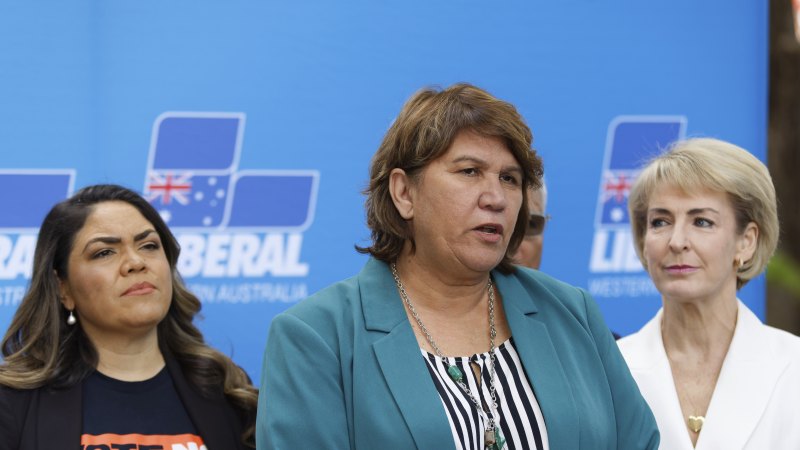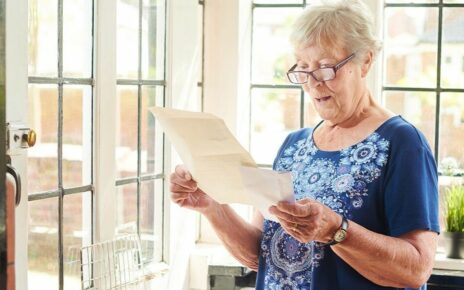Save articles for later
Add articles to your saved list and come back to them any time.
The Liberal Party’s sole Indigenous MP has accused the authors of an anonymous letter censuring people who voted No in the Voice referendum of lacking the courage to put their names to it in the most forthright political response to criticisms made by Yes case leaders.
Coalition frontbencher Kerrynne Liddle says the letter, released on Sunday night, stunned her and has questioned the courage of Indigenous leaders who authored it, urging them to accept responsibility for the democratic outcome.
Liddle delivering a speech in September, 2022.Credit: Alex Ellinghausen
In an unpublished draft version of the open letter, revealed in this masthead on Sunday, Liddle was accused of being a “front person” for right-wing think tanks that “used black people to fight black people”.
“I wasn’t a front person for anybody. I’m a proud Indigenous woman. I’m also a member of parliament and a contributing member of my community,” she said, adding that she had seen the draft that named her.
“This wasn’t a political decision for me. I held this position way before I came into politics.”
The former journalist and resources industry executive was involved in various Indigenous organisations before she was elected to the Senate last year and has opposed the Voice for years.
Opposition Leader Peter Dutton said in April her anti-Voice stance was influential in shaping his own views.
Liddle took aim at an unsigned document that labelled the October 14 outcome “appalling and mean-spirited”, claimed lies were the campaign’s “primary feature”, and argued the truth of the Voice poll was that “the majority of Australians have committed a shameful act whether knowingly or not”.
The document released on Sunday said Australia belonged to Indigenous people and that it was the “legitimacy of the non-Indigenous occupation in this country that requires recognition”.
“For people that claim to have spent a week in mourning, you would have hoped in reflection that they would have not come out with such an aggressive response,” Liddle said in an interview.
“They should be looking at themselves, not pointing the finger at everybody else.”
“They haven’t listened. They say they represent all Aboriginal and Torres Strait Islander people. They represent themselves.”
“Imagine if one or more of those individuals who authored this ended up on the unexplained constitutionally enshrined Voice. We’d be hearing this type of toxic talk forever.”
While no names were attached to the letter, several sources who asked not to be named so that they could speak freely previously confirmed Uluru Dialogue leader Megan Davis and Yes23 campaigner Noel Pearson were among many involved in the drafting.
Evidence cited by this masthead shows Pearson and Thomas Mayo had some level of contribution to editing the document, though the extent of any individual’s involvement is unclear.
Some senior Indigenous leaders, including June Oscar, Mick Gooda and Pat Turner, objected to parts of the historic document.
The South Australian senator said the letter misleadingly portrayed the vote as a rebuff of symbolic recognition of First Australians when in fact it was a spurning of what she said was a flawed, unconvincing idea of a new advisory body.
“I think it is outrageous to be suggesting that people rejected Aboriginal people or they rejected closing the gap,” Liddle said.
“What people rejected was the proposition of Voice … The letter ignores the very thing that was problematic for most Australians.”
“Albanese took a proposition straight from the very people that put this letter together in 2017 [the Uluru Statement from the Heart] and he didn’t amend it at all. There was no compromise. And from these people, there’s still no compromise in their position. They’ve learned nothing.”
Liddle said the Yes leadership had failed to accept the loss despite the competitive advantage it had as a result of an “extraordinary amount of money” and the prestige of the leaders involved.
The open letter’s claim that remote Indigenous communities overwhelmingly supported the Voice was disproved by results in Indigenous communities in her home state, she claimed.
Cut through the noise of federal politics with news, views and expert analysis from Jacqueline Maley. Subscribers can sign up to our weekly Inside Politics newsletter here.
Most Viewed in Politics
From our partners
Source: Read Full Article




